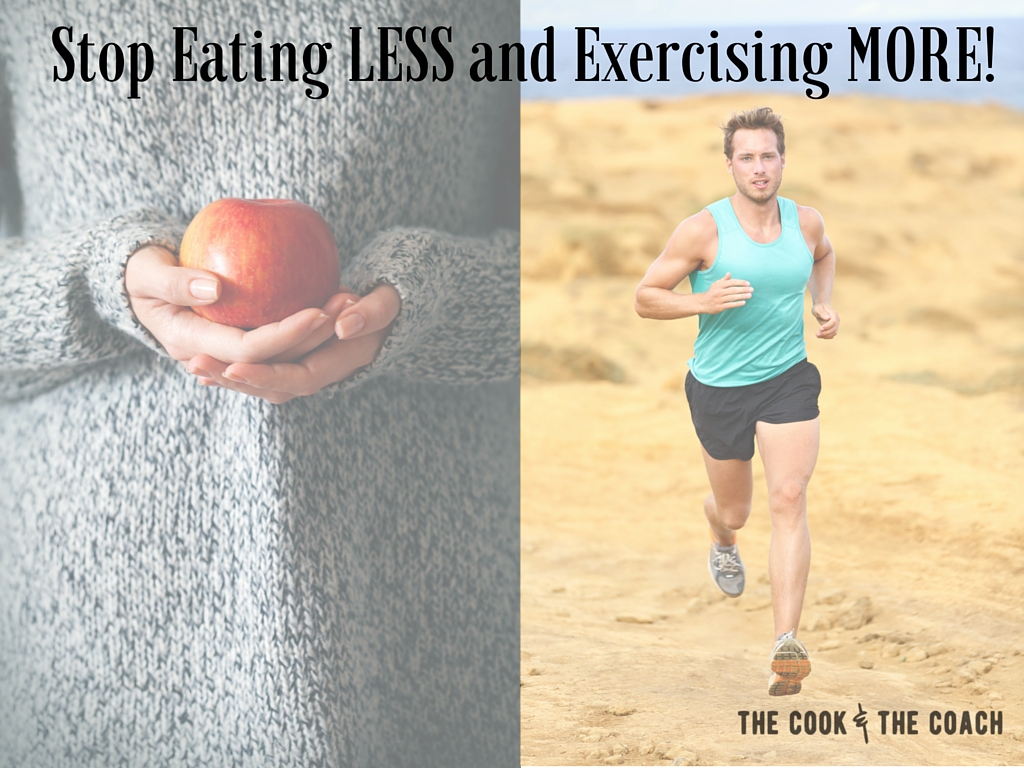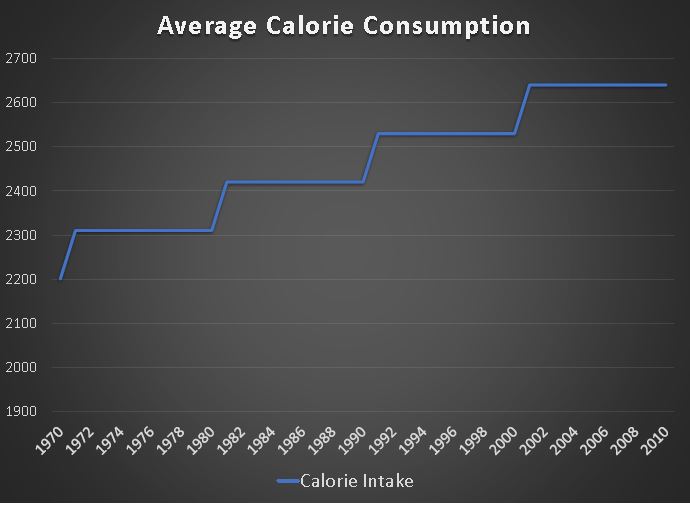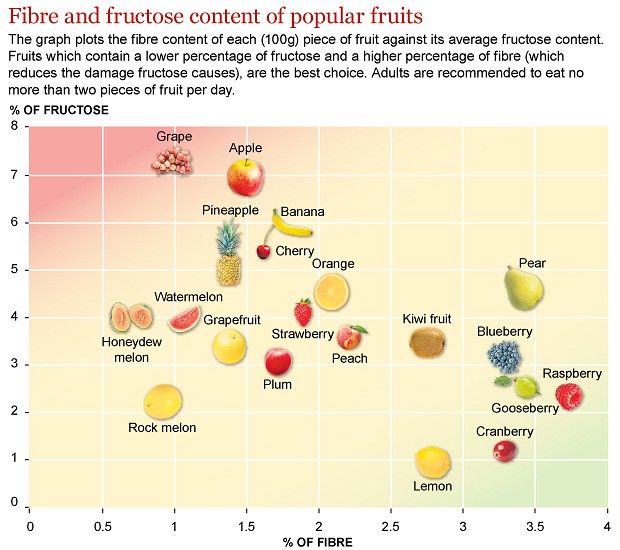|
So I have a very selfish reason for writing this blog post. We work with a lot of people and chances are if you are reading this, you are one of them. One of the most common mistakes we see from people in our challenge groups is that they do not eat ENOUGH food. Yeah you heard that right, people in our groups that want to lose weight, aren't eating enough. Crazy right?? Honestly, it's no secret that most people believe that the best way to lose weight is to exercise more and eat less.
You may have heard that a pound of fat is the equivalent to 3,500 calories. So based on the that figure, if you ate 250 less calories per day and exercised enough to burn 250 more calories you would lose 1 pound per week. Carry that out over a year and you have an amazing 52 pounds lost. Seems pretty simple, but unfortunately our metabolism doesn't work like a math equation. Let's think about it the other way too. According to the NY Times the average American is consuming 20% more than they were in 1970. Making a couple of assumptions, if our Basal Metabollic Rate (BMR) stays the same from 1970 and our exercise quantity stays the same the average American male based on this information would weigh 1,372 lbs. Pretty sure the average weight of Americans have gone up but not by over 1,000 lbs.
So clearly our metabolism isn't just a simple math equation. There are a lot of other things that come into play, the quality of the food we eat, hormones, stress, the balance of macro nutrients that you eat and toxins in your body...to just name a few. I'm not trying to say that quantity doesn't matter, it does, but the reason for this post is to tell you that it's not the only thing that comes into play if you are trying to lose weight.
I like the way the folks over at Metabollic Effect explain our metabolism, that it acts more like a seesaw or thermostat. Our bodies are constantly striving to be in a state of homeostasis and balance. So when we put more energy in, it burns more energy and when we limit the amount of energy that goes in, our body adjusts accordingly to that also. Or as Jonathon Bailor explains: our bodies metabolism/biology doesn't work like math...our bodies biology works like biology. What happens when you eat a calorie deficit diet?
Let's say a person's goal is to lose 20 lbs. Based on everything that they've ever been told, they should eat a little less, exercise a little more and therefore create a calorie deficit and burn fat. If all other things in your body stayed the same, this strategy would work and the 20 lbs would come off in a matter of a few months. When people employ this strategy some weight will usually come off at first. There is definitely a time during these early days where a person isn't stressed out by the new exercise and the food level is new so it isn't taxing their body as much. It's almost like these people are on an adrenaline high...this new stuff is exciting, they're energized so their mind is riding those emotions and carrying them through.
THEN that newness and adrenaline wears off and you are left with someone that is tired, sore and hungry....Frustration sets in pretty quickly and workouts get spread out a little further and and a few more treats get added back in. All of a sudden, they are back to a calorie neutral diet, but it feels like they are still doing the right things and they aren't losing any weight. So they throw the towel in and go back to old ways. The problem is they pack the original weight back on faster than it came off because during that first couple of weeks their body's metabolism slowed to match up with the level of exercise and calories they were consuming. How to eat at a calorie deficit but avoid the yo-yo dieting
If weight loss is your goal then yes your body has to burn more energy than it consumes, plain and simple. So how do you burn more calories without running into the problem explained above? The key is pace, quality of food, and body composition.
You can lose weight really fast if you want to, the quickest way to lose 20 lbs would be cut your leg off. You could also starve yourself and lose a lot of weight really fast...it will consist of water, lean tissue, and some fat with the fat being one of the last things to go. Both of those are absurd and obviously not practical. So the key when undertaking a weight loss journey is to keep the focus on your overall health the entire way. That means getting your daily nutrients no matter what. Even if getting those nutrients means you exceed your calorie consumption number for that day. Depending on how much weight you have to lose, I recommend aiming for 1-1.5 lbs per week. If you were completely extreme with your nutrition and activity level, you might be able to lose 2-3 lbs. But remember these are averages too, so you might lose 5 lbs week one but then not see the scale move a whole lot weeks 2 and 3. As long as you don't add weight, you are still at that 1.5 lbs per week. The key here is steady weight loss and going into it with the right expectations. You won't have a sense of failure if your weight loss stalls out, because you are thinking long term averages, not daily or weekly fluctuations. Quality of food is so important when making a change also because nutrient composition is key. You are looking for whole foods that are nutrient dense. These are mainly going to be your vegetables. In particular colorful veggies. Look for your greens, reds, oranges, yellows. Color is a sign of phytonutrients in your food, so the wider array of colors the better. The reason I don't mention eating a lot of fruit is that a lot of fruit (bananas, apples, grapes) are loaded with sugar which can have issues with your metabolism). Often times I think people think that because they are eating a ton of fruit, they are being extremely healthy and that isn't always the case. The fruits that are lower in fructose and higher in fiber will be the most beneficial.
On top of vegetables and selected fruits it is also important to get high quality proteins. A few of our favorites are organic chicken breasts, wild caught salmon, ground turkey, and pork tenderloin. Obviously when you can buy organic meats that is preferred but sometimes they aren't available or sometimes you just don't have the money. So a rule of thumb that we use is the fattier the meat the more important it is to be organic. Toxins tend to get stored in fat cells. So bacon, hamburger, steaks, fattier cuts of pork are going to be better to get organic. Leaner proteins like fish if wild caught, turkey, pork tenderloin are things you can potentially go the regular route.
The last thing that is important for long term weight loss is focusing on your body composition (that is the balance of body fat to lean tissue). Our skeletal structure is pretty much a fixed number barring any amputations or severe osteoporosis. Something that tends to happen when someone begins working out and eating better is that some weight comes off right away, usually water weight, then people plateau for a brief stint. What most likely is happening here is a person is losing body fat, but gaining muscle. Muscle is quite a bit more dense than fat so rather than look at the scale a better measure would be either measurements or body fat %. Your goal should be fat loss more so than weight loss. Change your thinking and your journey will be quite a bit more peaceful. Before explaining this last piece I want to quickly explain what metabolism actually is. Your metabolism is very simply the energy your body burns at the cellular level to perform the daily tasks that you are doing. The more cells, the more activity, the higher your BMR. This is why a bigger guy needs more calories than petite women. Another reason guys need more calories than women is due to the fact that most guys have a higher % of muscle tissue to fat tissue. See where I'm going with this...
The higher % of lean muscle tissue = More calories burned
So when you begin your fat (weight) loss journey focus on building muscle rather than burning calories. Although cardio activities can build a little bit of muscle, you will plateau and so will your BMR. This is where strength training, whether it be with body weight exercises or lifting weights is important.
Now we addressed how your body can balance your calories in versus calories out so that you can successfully burn fat and lose weight. There were a few other things that I mentioned earlier that also play a role in how our bodies burn calories: stress, hormones, balance of macro nutrients, and toxicity of our body. I would love to go farther in depth into each of these rather than just skim the surface, so look for a future blog post that touches on these areas. In the meantime focus on quality of food, quality of exercise that results in muscle development and have a lot of patience. A lot of times if you focus on those things the rest of our body's biology figures out a way to manage hormones and eliminate toxins. Our bodies are pretty amazing!
5 Comments
Oh my goodness, this is such a great post. Its not bookmarked so I can referance the fruit chart and your suggestions on organic meat
Reply
Dan Suedbeck
10/29/2014 01:13:14 am
Thanks Amber, we appreciate you sharing this message. So many people have it backwards. Keep up the work on your end too!
Reply
Ellie
7/16/2015 01:37:56 pm
LOVE this!! Great summary!
Reply
10/16/2022 10:31:33 pm
this summary is help me lot and people like me keep sharing this type of content.
Reply
Leave a Reply. |
The Cook & The CoachHealthy is a LIFESTYLE. Categories
All
Archives
November 2019
|
About Us
|
Contact UsAffiliate Disclosure
|




 RSS Feed
RSS Feed

